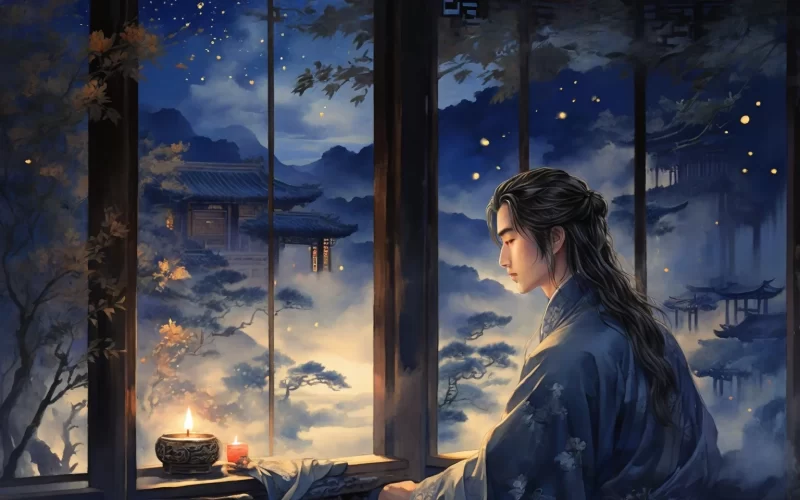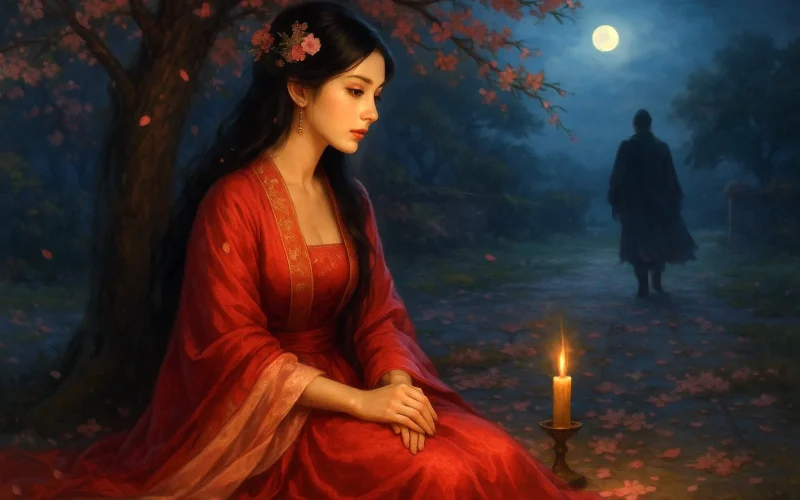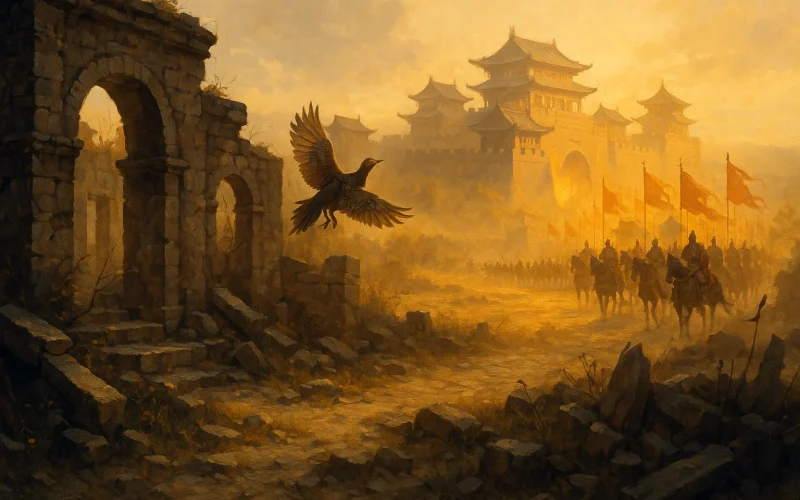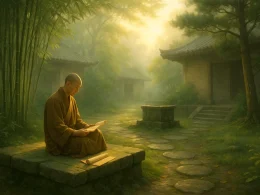You said you'd come but you have gone and left no trace;
I hear in the moonlit tower the fifth watch bell.
In dream my cry could not call you back from distant place;
In haste with ink unthickened I cannot write well.
The candlelight illuminates half our broidered bed;
The smell of musk still faintly sweetens lotus screen.
Beyond my reach the far-off fairy mountains spread;
But you're still farther off than fairy mountains green.
Original Poem:
「无题四首 · 其一」
李商隐
来是空言去绝踪,月斜楼上五更钟。
梦为远别啼难唤,书被催成墨未浓。
蜡照半笼金翡翠,麝熏微度绣芙蓉。
刘郎已恨蓬山远,更隔蓬山一万重!
Interpretation:
This poem by Li Shangyin, a renowned poet of the Tang Dynasty, is a love poem expressing a man’s profound longing for his distant beloved. The poem is marked by delicate emotions and a masterful structure. By intertwining dreams with reality, it portrays the pain of separation and the steadfastness of love. The references to Liu Lang and Mount Penglai enrich the poem with cultural depth, adding a touch of melancholy and depth.
First Couple:“来是空言去绝踪,月斜楼上五更钟。”
(Your promise to meet again turned out to be hollow, and now you’re gone without a trace. At dawn, the waning moon tilts westward, and the tower’s bell rings to mark the fifth watch.)
The poet begins with the feelings upon waking from a dream, expressing the desolation and sorrow caused by separation. The beloved’s unfulfilled promise highlights the poet’s solitude and sense of loss.
Second Couple:“梦为远别啼难唤,书被催成墨未浓。”
(In the dream, I weep bitterly over our parting, but my cries cannot reach you. Upon waking, I hurriedly begin to write a letter, so hastily that the ink is still faint.)
This couplet illustrates the pain of separation, felt both in the dream and in waking life. The urgency to write amplifies the depth of longing, blending the dream world with reality and intensifying the emotional resonance.
Third Couple:“蜡照半笼金翡翠,麝熏微度绣芙蓉。”
(The dim candlelight casts its glow upon a curtain adorned with golden jadeite, and the faint scent of musk drifts across the embroidered lotus-patterned bedding.)
Through vivid descriptions of the interior setting, the poet evokes a dreamy, ethereal atmosphere. The fusion of tangible surroundings and wistful memories symbolizes the longing and imagination of the beloved, enhancing the poem’s enchanting tone.
Fourth Couple:“刘郎已恨蓬山远,更隔蓬山一万重!”
(Like Liu Lang of old, who mourned the unattainable Mount Penglai, the place where you’ve gone is even more unreachable than that distant fairyland.)
The poet uses the tale of Liu Lang’s failed quest for immortality as an allegory for the pain of love lost to distance. The barrier between the lovers is portrayed as more daunting than the mythical divide between the mortal and the immortal, deepening the sense of sorrow.
Writing Features:
- Fusion of emotions and imagery: The poet alternates between dreams and reality, blurring their boundaries to create a hazy, mystical artistic effect.
- Skillful use of allusions: References to Liu Lang and Mount Penglai subtly highlight the profound obstacles in love, enhancing the poem’s cultural richness and thematic depth.
- Reverse chronological structure: The poem begins with the emotions upon waking, then retraces the events of the dream and its aftermath, building layer upon layer of emotional depth.
- Rich imagery: Symbols such as the candle, golden jadeite, and embroidered lotus are both realistic and evocative, representing the beauty and sorrow of love.
Overall Appreciation:
The poem uses the motif of “dream” to depict the heart-wrenching longing born of separation. The poet begins with the loneliness of waking and moves into reflections on the dream, blending fantasy with reality to capture the complex psychology of separation. The brief joy of the dream contrasts sharply with the lingering sorrow of waking, culminating in the image of insurmountable distance with Mount Penglai as its metaphor. This conclusion ties back to the opening and elevates the emotional impact, leaving readers moved by the poet’s deep lament.
Insights:
The poem conveys a message of unwavering devotion and longing for love, suffused with sorrow yet cherishing the beauty of affection. By merging dreamscapes with reality, the poet reminds readers to value emotions, even amid separation, and to appreciate the profound subtleties of longing and love.
Poem translator:
Xu Yuan-chong (许渊冲)
About the poet
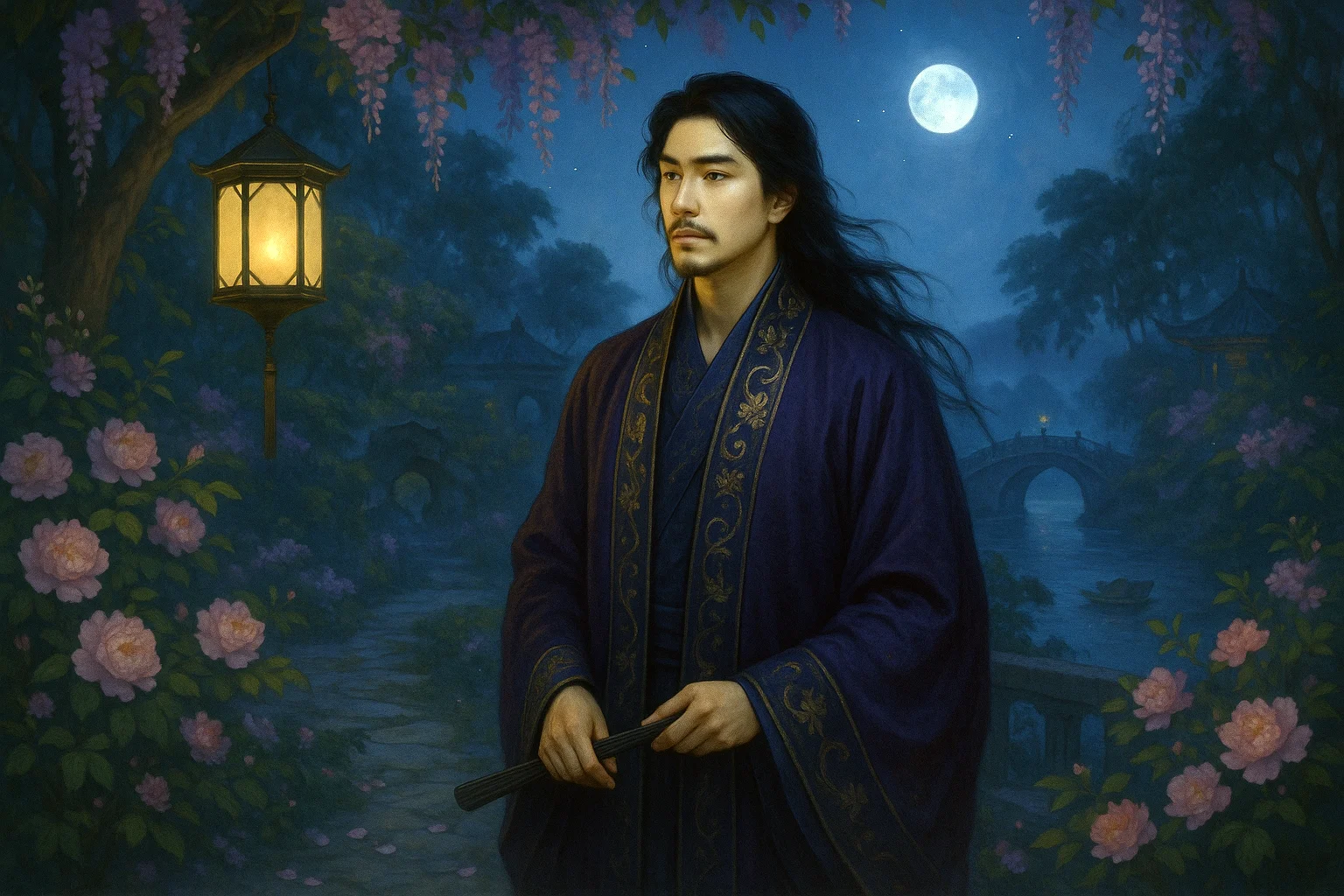
Li Shangyin (李商隐), 813 - 858 AD, was a great poet of the late Tang Dynasty. His poems were on a par with those of Du Mu, and he was known as "Little Li Du". Li Shangyin was a native of Qinyang, Jiaozuo City, Henan Province. When he was a teenager, he lost his father at the age of nine, and was called "Zheshui East and West, half a century of wandering".






